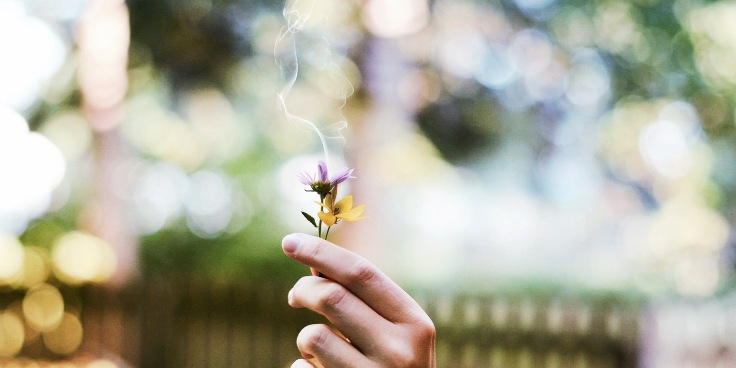
When I was about 14 years old, I co-wrote my first book.
Back then, I was all about thrillers and read everything that was written at that point by authors such as R.L. Stine and Stephen King, so it was only natural that our book had the cheesy title, “The Accident,” and was set in the random location of Akron, Ohio, where my young finger had just happened to land on a map.
Of course, it was not published, and I did not even know that the original copy (there was only one, let’s be honest) of this was still around until my brothers and I were going through an old box of things that my mother had saved last Thanksgiving. There it was—right along with the dusty yearbook with photos of me with glasses that were even larger than my big hair, and an old retainer.
Perfect.
When I read through some of what my friend and I had written, I was actually a bit amazed at how well I had been writing back then with absolutely no training, education or guidance when it came to such things.
But, I did laugh about how silly it was, in the same way that I look back on the first article that elephant journal published that I submitted about 15 months ago—almost as if they were both written by completely different people, rather than different versions of who I am today.
Now, I face another complex challenge and that is of writing my first actual book as an adult that I will be publishing. I consider myself to be extremely lucky to be a part of a community of writers, many who are also working on books, and we all seem to be struggling with the same thing right now.
The struggle is that of wanting perfection.
The struggle is also that of feeling as if what we are writing now will be something that we may look back on in either two years or two decades, with more mature and wiser hearts and minds, and wish we would have done it differently.
This is one of those paradoxical situations where what we perceive as being the problem is actually the solution, similar to those times when the answer to a certain question lies in the question itself.
The lesson here is that of fertility and creation and the miracle and perfect timing that all of this really is.
If we consider even our existence, the conception of ourselves and what some believe is Divine timing, we can rely on this as evidence that everything that is ever created is created perfectly at the exact moment that it is created.
For instance, if our parents had not come together sexually (creatively) at the exact moment in time that they did, and the exact cells that came together as well at that time did not do their thing in the way that they did, we would not even be who we are.
The odds that “we” are even “we” are incredible when one considers that even the slightest shift in circumstances would likely have created a different person.
The same goes for anything that we create.
I received a decent number of responses and views for that first article of mine, way back when, because my voice at that time spoke to whom it needed to speak. It resonated with the people that it did because that version of my voice was what came out of me at that time, and for that article that I wrote on gratitude, people were grateful.
Anything that we are inspired to create in any moment, is that of perfect timing.
If we are being authentic to ourselves and to the creative expression of who we are and how we want to “play” (create), then this is our solution.
The solution to creativity is not that of perfection, rather it is that of this alignment and first and foremost finding ease.
Creativity is ultimately about letting go.
Some of the best relationships thrive once people let go of them. They let go of the clutching and the grasping and the codependent dynamic to the point to where they are projecting no expectations.
Fertility is tricky, and we use this same energy to create so much more than babies.
Similarly to how some women get pregnant soon after they stop trying so hard to do so, our other creative endeavors seem to come the most easily when we can allow ourselves to let go of the effort.
We can choose to just allow creativity, and we can allow whatever we are creating to be conceived and created in it’s own time. Sometimes this is the most difficult part, but the stress of trying to make something only hinders the process and takes away from the joy of it all—which is why we create in the first place, no?
Recently, I was stuck with my book. I was blocked and was making no real progress beyond turning things over in my mind, which I know is part of the process but this typically is not how I create.
I realized that even though this is on a subject that I take very seriously, that I had lost touch with the “play” part of my creativity. It had become heavy, and I needed to let it go a bit.
I needed to lighten up.
My book titled, “The Accident,” was no accident at all. It served a purpose for me that was not the glory of publication, nor being seen as a writer to a large audience, it just was—for the sheer enjoyment of creating and I am so grateful for that reminder from my younger self, decades later.
And now I learn from that.
Sure, we may have to work. We need to take steps. For our creative endeavors, we maybe need to type on a keyboard, or buy paintbrushes, or swing a hammer many, many times, but when we can align ourselves with inspiration and when we love what we do, this does not feel like “work.”
It may be tiring, but it is the same type of exhaustion that can come with playing with children, or working through a conflict in a healthy manner with a partner—the rewarding type of fatigue, the type of fatigue which feels satisfying on a soul level.
I read once a long time ago that someone had said that they had had the goal of living in a way to where when they were at their life’s end, they wanted to simply say, “That was fun, I am tired.”
This stuck with me and I carry this around with me, as maybe you will as well.
We can choose to do this differently.
We can let go of the need for perfection and choose to find the “play” and the joy in whatever we are creating, whether that is art or a new job or even a new relationship.
We can rest when we need, and if we are going to be tired, we can choose to be tired from having fun with it all.
Author: Katie Vessel
Editor: Renée Picard
Image: McKinley Law/Unsplash


 Share on bsky
Share on bsky




Read 0 comments and reply